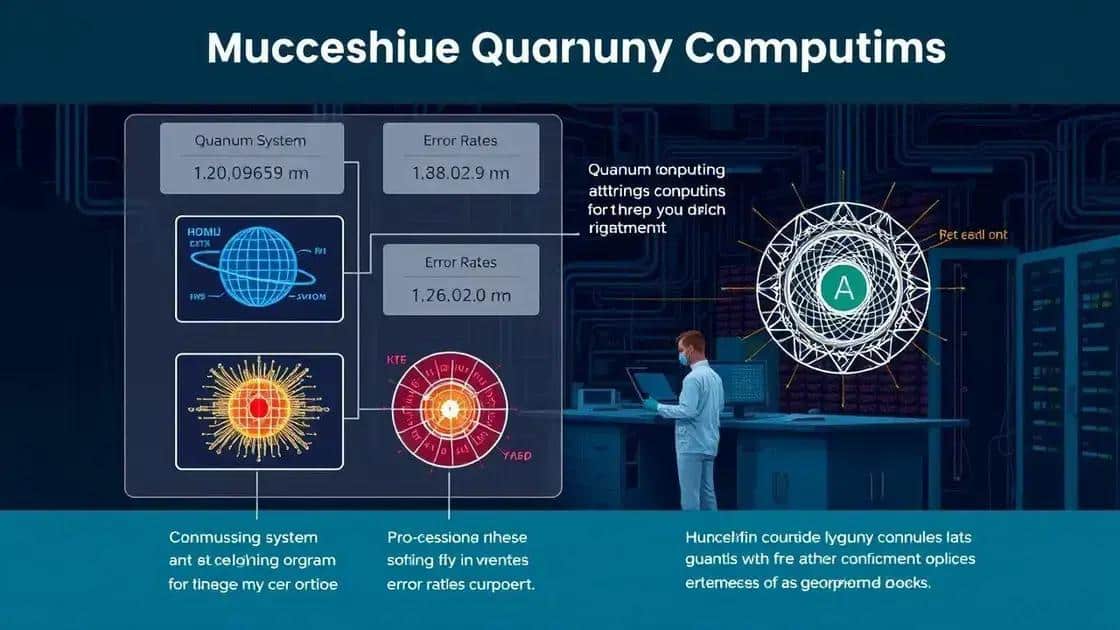Insights on quantum computing updates that you need

Quantum computing is revolutionizing industries, overcoming challenges like error rates and scalability while offering significant benefits in healthcare, finance, and logistics through advanced data processing and problem-solving capabilities.
Insights on quantum computing updates are becoming increasingly essential in our rapidly evolving tech landscape. Have you ever wondered how these advancements might change our world? Let’s dive into the latest updates together.
Understanding quantum computing basics
Understanding the basics of quantum computing is crucial as it represents a significant leap in technology. Unlike classical computers, which use bits, quantum computers utilize qubits. These qubits can exist in multiple states at once, allowing them to perform complex calculations much faster. This capability opens up new possibilities in various fields.
The Fundamental Principles of Quantum Computing
At the core of quantum computing are two essential principles: superposition and entanglement. Superposition allows qubits to be in a combination of states (0 and 1) simultaneously. This feature dramatically increases the amount of data a quantum computer can process.
Entanglement: A Key Feature
Entanglement occurs when qubits become linked in such a way that the state of one qubit instantly affects the state of another, no matter the distance between them. This interconnectedness enables quantum computers to solve problems that are currently impossible for classical computers.
Benefits of Quantum Computing
- Faster problem resolution and optimization
- Enhanced capabilities for data analysis
- New algorithms for cryptography
As researchers dive deeper into quantum computing, the implications extend beyond computer science. Industries such as finance, healthcare, and logistics stand to benefit significantly. For instance, quantum algorithms could revolutionize drug discovery by simulating molecular interactions far more efficiently than current methods.
Quantum computing is also poised to transform artificial intelligence, providing advanced computing power that could help machines learn faster and make more complex decisions. As technology evolves, understanding these basic concepts will become increasingly important for navigating the future landscape of innovation.
Key recent advancements in quantum technology

Key recent advancements in quantum technology are revolutionizing various fields and enhancing our understanding of physics. In the past few years, researchers have made remarkable strides in quantum computing, communication, and sensing. These developments not only demonstrate the potential of quantum mechanics but also pave the way for practical applications that could change our everyday lives.
Quantum Computing Breakthroughs
One of the most significant advancements is the increase in the number of qubits that can be effectively controlled. Companies like Google and IBM have reported new architectures that allow for more stable and scalable quantum computers. This is crucial as it enhances computational power, making complex calculations much faster.
Advances in Quantum Communication
Quantum communication has also seen rapid progress. The introduction of quantum key distribution (QKD) has strengthened the security of digital communications. With QKD, information can be transmitted without the risk of interception, as any eavesdropping attempts would be detected immediately. This technology is becoming vital for securing data in financial sectors and government communications.
- New encryption standards for data protection
- Development of satellite-based quantum communication
- Integration with existing communication networks
In addition to computing and communication, advancements in quantum sensing are also noteworthy. Quantum sensors can detect minute changes in their environment with unparalleled precision. This capability can significantly affect fields like medicine, where early diagnosis of diseases may be possible through improved sensing techniques.
Furthermore, researchers are exploring the use of quantum technology in artificial intelligence to enhance machine learning algorithms. This integration could lead to faster processing capabilities and smarter AI systems, opening up new possibilities for automation and efficiency in numerous industries.
Real-world applications of quantum computing
Real-world applications of quantum computing are beginning to emerge, showcasing how this technology can reshape industries. As researchers and companies explore its potential, we see significant advancements in various fields such as healthcare, finance, and logistics. These applications are not just theoretical; they demonstrate the tangible benefits of quantum technology.
Healthcare Innovations
In the healthcare sector, quantum computing offers revolutionary possibilities. One key application is in drug discovery. By simulating molecular interactions at a quantum level, scientists can identify potential new drugs much faster than traditional methods. This speeds up the development process and can lead to breakthroughs in treatments.
Financial Modeling
The finance industry is also leveraging quantum technology. Financial institutions use quantum algorithms to enhance their risk analysis and optimization processes. With the ability to process vast amounts of data quickly, these algorithms can improve decision-making and lead to greater profitability.
- Portfolio optimization with complex financial models
- Faster fraud detection systems
- Enhanced stock market predictions
Moreover, quantum computing is paving the way for new advancements in logistics and supply chain management. For example, it can help optimize routing and inventory management, significantly reducing costs and improving efficiency. Companies can analyze data from various sources in real time, allowing for better responsivity to market changes.
As more industries adopt quantum computing, the potential for new applications continues to grow. From environmental modeling to advances in artificial intelligence, the technology holds promise for revolutionizing how we approach complex problems.
Challenges facing the quantum computing industry

Challenges facing the quantum computing industry are significant and impact its growth. Despite the many advancements, several obstacles arise that impede widespread adoption. One major challenge is the error rates in quantum computations. Quantum bits, or qubits, are highly sensitive to their environment, which can lead to errors in calculations. This instability makes it difficult to rely on quantum computers for practical applications.
Scalability Issues
Another critical challenge is scalability. While small quantum systems have shown great potential, developing larger systems with more qubits remains a complex task. Scaling up while maintaining coherence and error correction is crucial for making quantum computing practical for real-world problems.
Limited Quantum Algorithms
The availability of effective quantum algorithms presents another challenge. Unlike classical computing, where algorithms are well-established and widely used, the quantum realm still requires the development of more efficient algorithms. This gap limitations the areas where quantum computing can provide a meaningful advantage.
- Need for robust error correction methods
- Development of new quantum algorithms
- Training workforce with quantum skills
Furthermore, there is a significant shortage of skilled professionals in the field. As the industry grows, the demand for expertise in quantum physics, computer science, and engineering also increases. This shortage can slow down progress as companies compete for talent in a rapidly evolving job market.
Finally, there’s the challenge of high costs. Building and maintaining quantum computers require substantial financial investment. As a result, only a limited number of companies and research institutions can afford to pursue quantum research. This financial barrier restricts innovation and slows down the development of new technologies.
FAQ – Frequently Asked Questions about Quantum Computing
What are the biggest challenges in quantum computing?
The main challenges include error rates, scalability issues, and the need for more effective quantum algorithms.
How can quantum computing benefit the healthcare industry?
Quantum computing can significantly speed up drug discovery and improve the effectiveness of treatment processes.
What role does quantum technology play in finance?
In finance, quantum technology enhances data analysis speeds, improves risk assessment, and optimizes investment strategies.
Why is there a demand for skilled professionals in quantum computing?
As the quantum computing field grows, there is an increasing need for experts in quantum physics, computer science, and engineering to drive innovation.





